Block and allow access to sites and specific URLs by adding them to the exception list. Share exception lists with other users in your organizational unit (OU).
Create as many exception lists as you need.
To create an exception list
Click Filtering from the Main Menu and then click Exception List from its sub-menu. The Exception List screen appears.
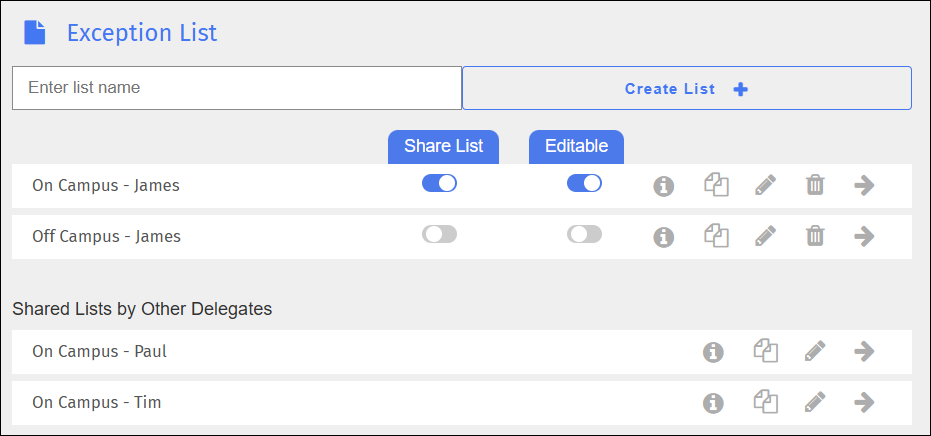
Type the name of the list in the Enter list name text box.
Click Create List+ to add the list. The new list appears at the bottom of the list.
Note
Exception lists shared with you by other users in your district appear in the lower half of the page. By default, only users in your OU appear. Depending on Administrator settings, users from other OUs can also appear here.
Block and allow as many specific URLs as you need in an exception list.
To block and allow URLs
Click Filtering from the Main Menu and then click Exception List from its sub-menu. The Exception List screen appears.
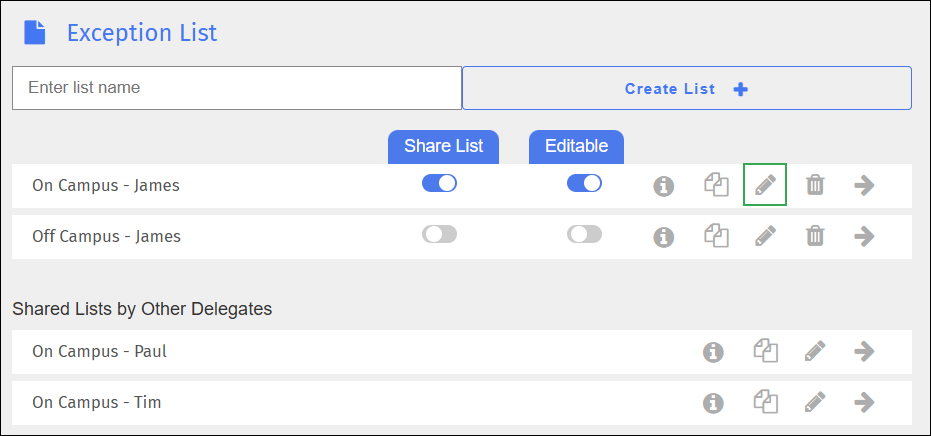
Locate the list for which to block and allow URLs, and click the
 icon (or create a new list). The Edit screen appears.
icon (or create a new list). The Edit screen appears.
Type the URL in the Enter URL text box.
Click the Block or Allow button.
Click Add to List + to add the URL to the list. The URL you entered appears after the examples. Note that the Allow button to the right of the URL name is selected (appears in blue).
Note
Click the Block or Allow button at any time to change a blocked URL to an allowed URL and vice versa. Click Update to block or allow the URL.
Note
Click the  icon to delete the URL from the list. A confirmation prompt appears. Click OK to delete the URL.
icon to delete the URL from the list. A confirmation prompt appears. Click OK to delete the URL.
Tip
Add URLs to the exception list from the Web Analytics screen. See Adding a URL to an Exception List for details.
Add URLs to exception lists directly from the Web Analytics screen.
To add a URL
Click Insights from the Main Menu. The Web Analytics screen appears.
Click the blue document icon to the left of a website name in the Popular Websites section. The Add Website to Exception List window opens.
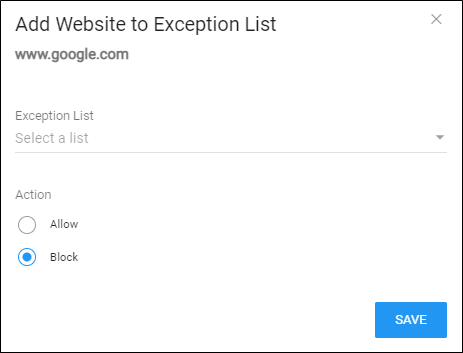
Select the desired list from the Exception List drop-down list.
Click Allow or Block to indicate whether to block or allow the website.
Click SAVE to add the website. The website is added to the selected exception list.
Delete a URL from an exception list when you no longer need it.
To delete a URL from an exception list
Click Filtering from the Main Menu and then click Exception List from its sub-menu. The Exception List screen appears.

Locate the list that contains the URL to delete and click the
 icon. The Edit screen appears.
icon. The Edit screen appears.
Click the
 icon to the right of the desired URL. A confirmation prompt appears.
icon to the right of the desired URL. A confirmation prompt appears.Click OK to delete the URL from the list.
Rename an exception list as needed.
To rename an exception list
Click Filtering from the Main Menu and then click Exception List from its sub-menu. The Exception List screen appears.

Locate the list to rename, and click the list name. A box opens to allow you to rename the list. Note that Blocksi added Save and Cancel buttons to the right of the name, as shown below.

Rename the list and click the Save button.
Modify an exception list as needed.
To modify an exception list
Click Filtering from the Main Menu and then click Exception List from its sub-menu. The Exception List screen appears.

Locate the name of the list to modify, and click the
 icon to the right of the list name. The Edit screen appears.
icon to the right of the list name. The Edit screen appears.
Make the necessary changes to the list.
Export your exception lists to a CSV file to keep for your records.
To export an exception list
Click Filtering from the Main Menu and then click Exception List from its sub-menu. The Exception List screen appears.
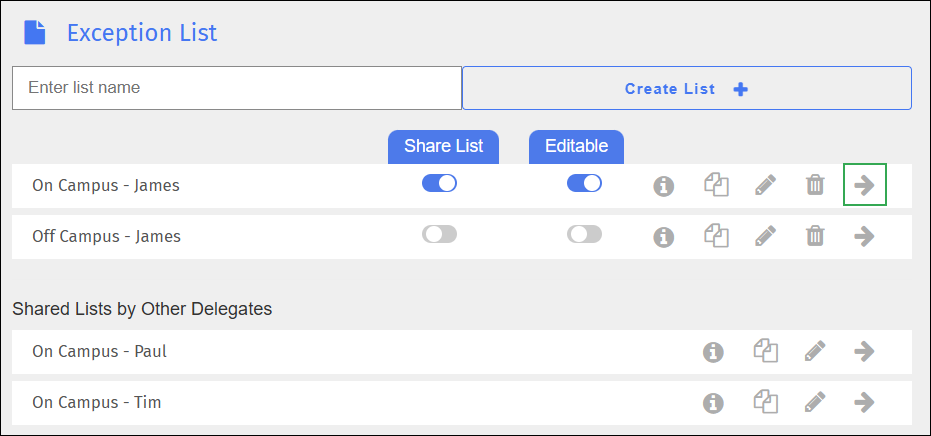
Locate the list to export, and click the
 icon. The file appears in the upper right-hand corner of your screen and is saved to your Downloads folder.
icon. The file appears in the upper right-hand corner of your screen and is saved to your Downloads folder.Navigate to your Downloads folder to open it and save it.
Note
In the spreadsheet, blocked URLs are indicated by a 1; allowed URLs are represented by a 0.
Use an existing list to create a new one.
To duplicate an exception list
Click Filtering from the Main Menu and then click Exception List from its sub-menu. The Exception List screen appears.
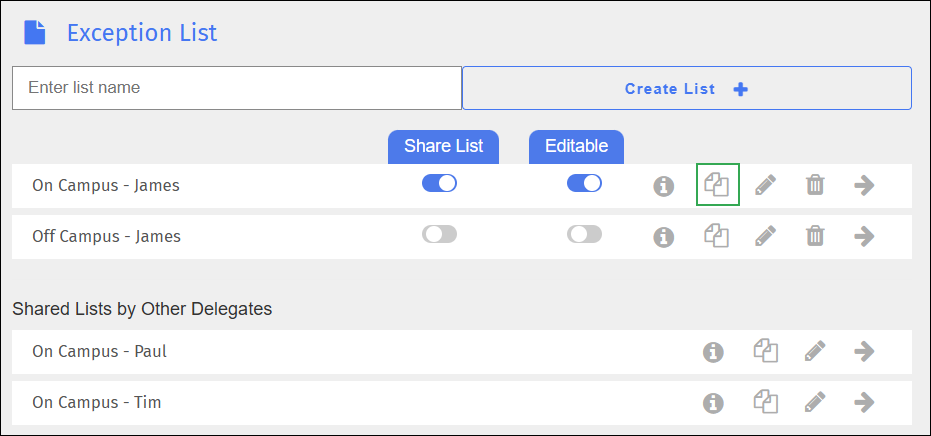
Locate the list to duplicate, and click the
 icon. The Duplicate List window opens.
icon. The Duplicate List window opens.
Type the name of the new list in the text box.
Click OK to add the list. The duplicated list appears at the bottom of the list. It contains the same URLs as the original list.
Make any desired changes to the new filter and save it.
Delete exception lists when you no longer need them.
To delete an exception list
Click Filtering from the Main Menu and then click Exception List from its sub-menu. The Exception List screen appears.
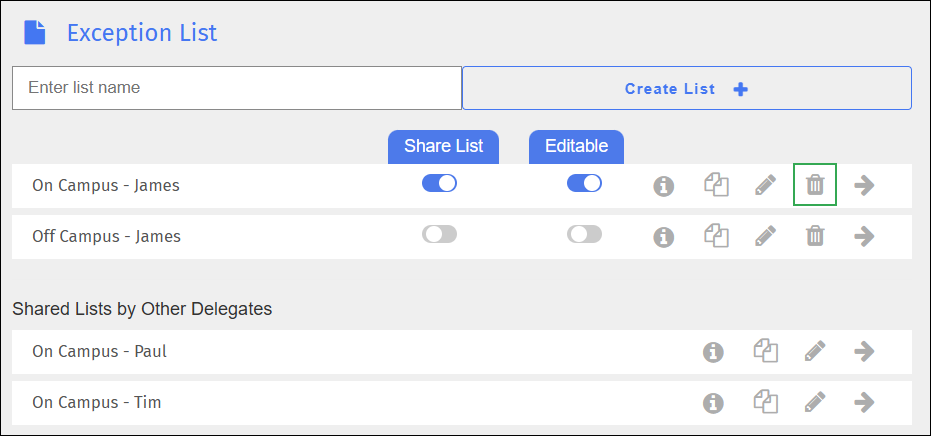
Locate the list to delete, and click the
 icon to the right of the list. A confirmation prompt appears.
icon to the right of the list. A confirmation prompt appears.Click OK to delete the list.
Share exception lists with other users.
Note
At any time, click the  icon to the right of a list name to see who has edited that list. Click the
icon to the right of a list name to see who has edited that list. Click the  icon to the right of a list name in the Shared Lists by Other Delegates section to see who owns that list.
icon to the right of a list name in the Shared Lists by Other Delegates section to see who owns that list.
To share an exception list
Click Filtering from the Main Menu and then click Exception List from its sub-menu. The Exception List screen appears.
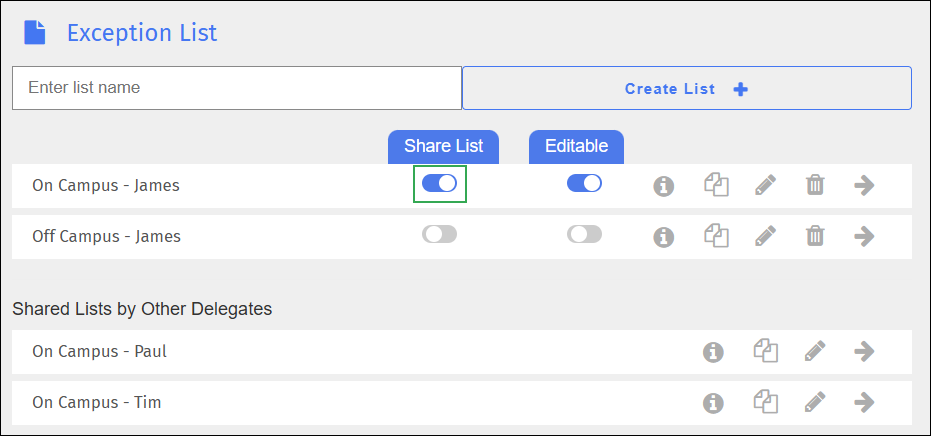
Locate the list to share and enable Share List. This list is now shared with all users in your OU.
Note
If you want to allow the other users to modify your list, enable Editable. This allows the users you have shared the list with to add and remove URLs from the list. They cannot change the name of the list.
Modify shared exception lists if the owner of the list gives you permission.
To modify a shared exception list
Click Filtering from the Main Menu and then click Exception List from its sub-menu. The Exception List screen appears.
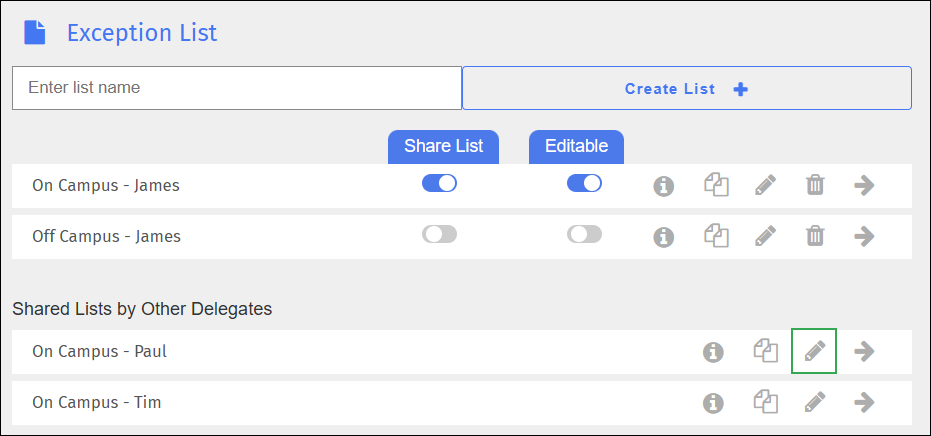
Locate the list to modify in the Shared Lists by Other Delegates section.
Click the
 icon. One of the following happens:
icon. One of the following happens:
If you are allowed to modify the list, you are taken to the Exception List Edit page.

If you are not allowed to modify the list, the following message appears in red at the top of the page: List editing disabled by list owner, followed by the username of the owner.
Tip
If you want to see the username of the list owner, hover your mouse cursor over the information icon.
Export your exception lists to a CSV file to keep for your records.
To export a shared exception list
Click Filtering from the Main Menu and then click Exception List from its sub-menu. The Exception List screen appears.
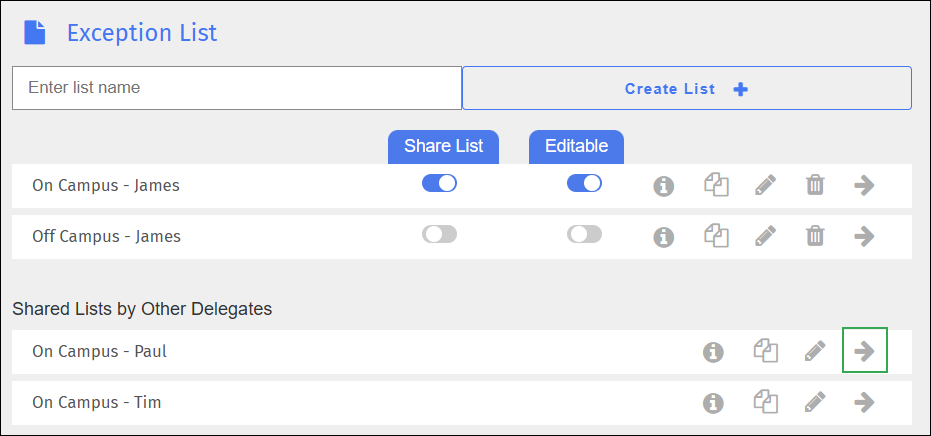
Locate the list to export in the Shared Lists by Other Delegates section, and click the
 icon. The file appears in the upper right-hand corner of your screen and is saved to your Downloads folder.
icon. The file appears in the upper right-hand corner of your screen and is saved to your Downloads folder.Navigate to your Downloads folder to open it and save it.
Note
In the spreadsheet, blocked URLs are indicated by a 1; allowed URLs are represented by a 0.
Duplicate shared exception lists if the owner of the list gives you permission.
To duplicate a shared exception list
Click Filtering from the Main Menu and then click Exception List from its sub-menu. The Exception List screen appears.
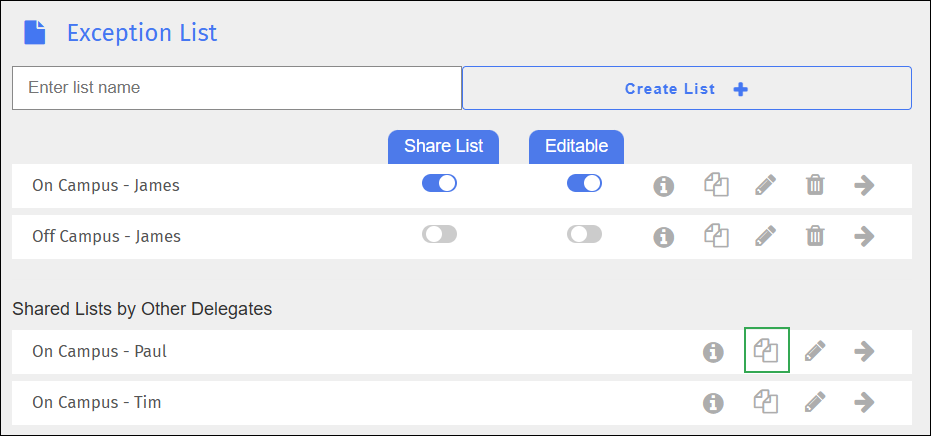
Locate the list to duplicate in the Shared Lists by Other Delegates section.
Click the
 icon. The Duplicate List window opens.
icon. The Duplicate List window opens.
Type the name of the new list in the text box.
Click OK to add the list. The duplicated list appears at the bottom of the list. It contains the same URLs as the original list.
Make any desired changes to the new filter and save it.